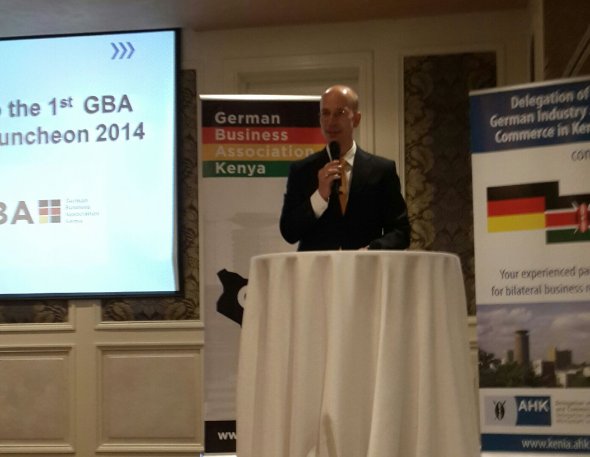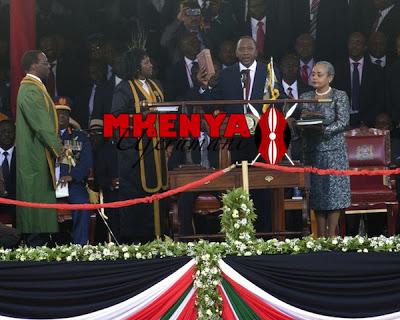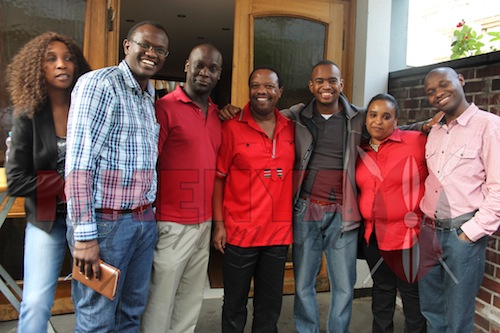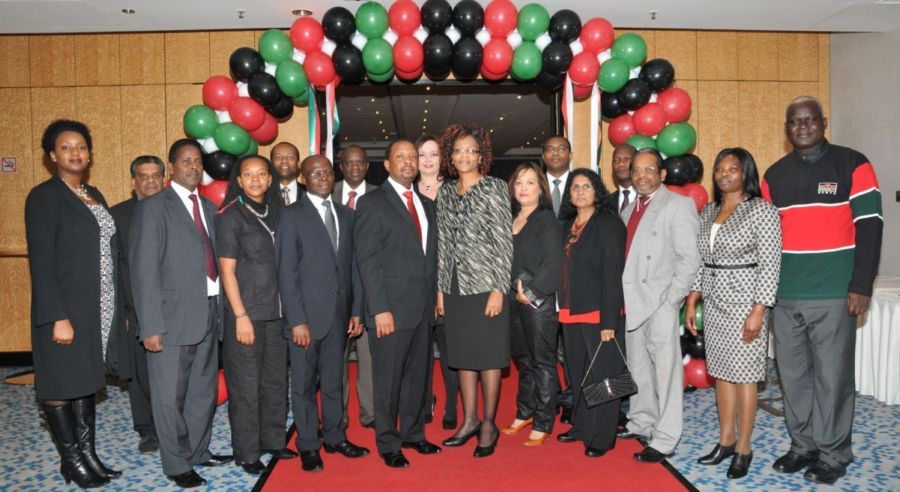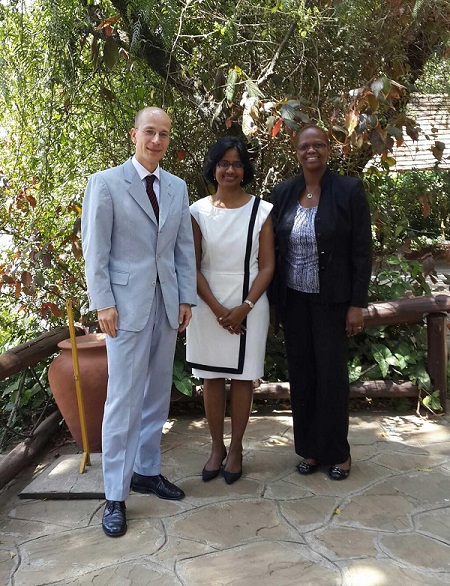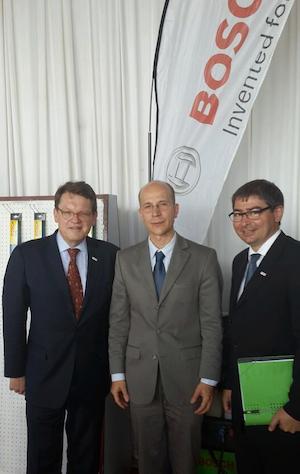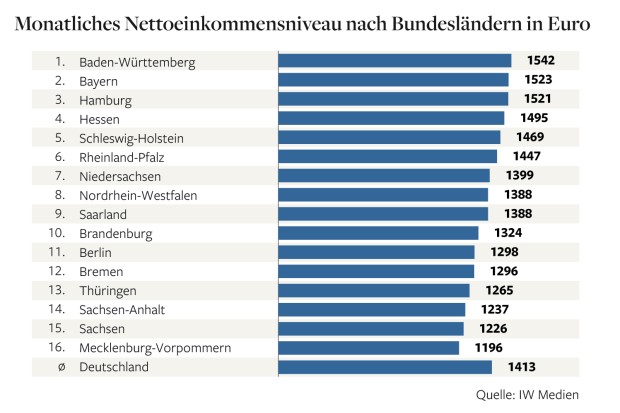At a meeting with the German Business Community, Ambassador Peschke exchanged views on the current economic situation and advocated close cooperation between all actors involved in business activities in Kenya. Board Members of the German Business Association (GBA) and the Delegate of German Industry in Kenya took the occasion to explain their priorities and objectives.
“Africa, a continent of opportunities”
Nowadays, Kenya produces almost half of the Gross Domestic Product in the East African Community. The country has an emerging middle class, ambitious plans for the modernisation of its infrastructure and a dynamic IT-sector which brought about M-Pesa. Consequently, Ambassador Peschke highlighted Kenya’s economic potential and business prospects for German companies. Today, about 3.800 people in Kenya work for German firms.
The Embassy as the “natural ally” of the German Business community will continue to “work intensively to further strengthen economic ties between Germany and Kenya as well as Germany and the East African region”. Andreas Peschke also invited the German Business Community to join forces with other German organisations on-site: as an example he named development cooperation in the sectors health, renewable energies or agriculture which provide opportunities for business and investment.
German Business in Kenya
Ambassador Peschke expressed his satisfaction about the dynamic growth in membership of the German Business Association which was founded 26 years ago and now comprises 96 firms. He also thanked the newly established Delegation of the German Industry for its outstanding commitment, particularly in the field of renewable energies. The Delegation organizes the Second German-Kenyan Economic Forum which is scheduled to take place during the first semester of 2014.
Full Speech:
The Chairman of the Board of the German Business Association, Mr. Proske,
Members of the Board of the German Business Association,
The Delegate of German Industry and Commerce in Kenya, Mr. Badoreck,
Members of the German Business Association, Ladies and Gentlemen,
And – as they say – all protocols observed,
Hamjambo? Habari zenu?
Ahsante sana kwa kunialika kushiriki katika mkutano wa German Business Association. Ninafurahi sana kuwepo hapa. Ninatumaini tutakuwa na majadiliano mazuri.
I am very happy to be here. It is an honour and a pleasure to meet with you. I was very much looking forward to talk to you.
Maybe I start with a few words about myself. Well, I am the new guy in town. I arrived at the end of October last year. I took up my duties as German Ambassador when I presented my credentials to H.E. the President at the beginning of December. Since then, I have been going around, meeting people, and certainly I have been learning a lot.
Before I came, I was the Spokesman of the German Foreign Ministry. I did this for almost six years. And I grew very much accustomed to put everything I had to say in very short one-sentence press statements. So I must say I struggled very hard when I prepared my 3 hour presentation that I am going to give to you today.
I have some African background. In my former life, I did African studies at university. And I served as a political officer at our German Embassy in Nigeria. This was good fun and really interesting. When they say about Kenya there is never a dull moment, well, in Nigeria it is even less dull, with lots of things going on all the time.
That’s about me. Now about you. I heard a lot about the German Business Association even before I arrived in Kenya. My predecessor our former German Ambassador to Kenya talked about you very highly. In fact, she asked me to give you her regards, when I told her I would be meeting you today. So here they are: warm regards from Margit Hellwig- Bötte to all of you.
In our view, the German Business Association is an important agent of German-Kenyan relations. What you have achieved in the last 25 years, is remarkable. We are very happy to notice the dynamic growth in your membership. I have been told that as of beginning of 2014, there are 96 companies that are members of the GBA, up from about 70 in 2012. That is remarkable and we hope that this trend is going to continue.
We see you as our natural allies in fostering and developing ever closer relations between our two countries, the Federal Republic of Germany and the Republic of Kenya. We would like to continue to cooperate with you quite closely. And we see ourselves as your logical service partners when it comes to provide you with assistance or support in areas where you might need it. That is our offer. It is my firm intention to forge a close relationship between you and the Embassy. Mr Dresbach our economic councilor is here. Many of you know him. Whenever you feel the need, feel free to contact us.
When it comes to Kenyan-German business relations, I am very happy that I must mention the Delegation of German Industry and Commerce here in Kenya. The story of GBA is remarkable, the story of the Delegation of German Industry and Commerce is no less remarkable. It was set up in 2012, the Delegate arrived the same year. Now, less than two years later, the Delegation has 7 permanent experts working German-Kenyan business relations, and more dealing with specific projects. This is an outstanding and very promising development. We support it very much. And I would to take this opportunity to thank our Delegate for his untiring commitment to the cause of business relations between our two countries. Thank you very much, Mr. Ingo Badoreck. Your work is very much appreciated. Let us continue to work closely together.
When I prepared my remarks, I was thinking what I could possibly tell you about business opportunities in Kenya which you didn’t already know much better than I do. In fact, very little.
So I thought maybe I tell how we see African things in Berlin right now. We have a new government. We have a new Foreign Minister who is an old hand because he served as Foreign Minister before. And as it is with every new government, we take a fresh look also on foreign policy.
One general thing is clear: Our new government and the new Foreign Minister are determined to support the activities of the German business worldwide. As one of our State Secretaries put it in a recent speech to business leaders in Berlin: “Great Coalition, that also means a great coalition for the support of German companies worldwide.” This is the general perspective.
Our German view on Africa is two-fold. On one hand side, Africa is still a continent of crisis. On the other hand side, Africa has become a continent of great opportunities.
If you look on current events in South Sudan, if you look of what is happening in the Central African Republic, or if you look of what happened in Mali in the last two years, you might even think Africa is sliding backwards. Hopefully, this is not so. But certainly there are still very many crisis spots, in Somalia, in Eastern Congo, in Northern Nigeria, to name just a few of them.
But of course, this is not the whole story. If you look at an overall growth rate of about 5 percent on the entire continent over the last couple of years, the picture is different. Which has been the fastest growing economy in the world recently? No, not China. No, not Mexico. It was Angola with about 11 percent. If you look at what is happening in Ghana, in Nigeria, in Mocambique and in many other places, you see dynamic fast growing economies with an emerging middle class, with a dynamic IT sector, and with a lot of potential.
So Africa seems to have two faces. Come to Kenya. Kenya is a case in point.
Kenya offers a lot of opportunities. It is the economic powerhouse of the region, producing almost half the GDP in the East African Community and according to figures I have been shown overtaking even Ethiopia in GDP output this year which has almost double the population of Kenya.
The projected growth rate for this year is over 6 percent.
It is the country which has by far the most robust private sector in the whole region.
It is the country which has by far the most open society in the region although lately we have seen tendencies to curb civic freedoms.
It is an anchor of stability in a very volatile region although it has had security problems of its own.
It has discovered raw materials, it is one of the great tea exporters world- wide, it grows good coffee, it attracts a lot of tourists, it has ambitious infrastructure plans, it has an ever more emerging middle class, its leadership has a modernization agenda, it has a dynamic IT-sector which created world novelties such as M-Pesa.
So certainly, it has many Pluses and there is a lot of potential. But if you look around, there are almost as many challenges.
If you look at the region. Conflict in Somalia, conflict in South Sudan. These are certainly no comfortable neighbours. And almost 1 million refugees from these countries are certainly a heavy burden to shoulder.
The security situation inside Kenya is also not easy. There is a terrorist threat as tragically exemplified by the heinous attack on the Westgate shopping mall. There are the challenges of day-to-day crime.
There are still many bureaucratic obstacles to doing business in Kenya. The question of work permits is one that has been discussed recently. There is the question of lacking infrastructure such as power shortages. There are the low marks on several indices: 121 out of 185 at the Ease of Doing Business, 106 out of 144 at the Global Competitiveness Index, 139 out of 176 at the Corruption Perception Index. These are certainly no rosy figures.
So Kenya has it both: many opportunities, but also changamoto kubwa, many challenges.
The question is: Where do we take it from here?
As a diplomat, my answer is: we try to work on the potential, we try to work on the opportunities, and we try to solve the difficulties. This is pure pragmatism. But while we cannot ignore the risks, we would be foolish to miss out on the opportunities, while others are very fast to grasp them.
Our policy is to develop relations with Kenya as one of our focus partners in the region. That means developing ties in the whole range bilateral relations can possibly have: political, culture, education, development cooperation, military, science, language, and business. We have the Goethe Institute in Nairobi, we have the German Academic Exchange Service, we have GIZ, we have KfW, we have our political foundations, we have BfAI, we have the Delegation of German Industry, and we have the GBA.
The idea is to make progress in each of these areas and to create synergies wherever this is possible.
In December, we had successful government-to-government negotiations between Kenya and German on development cooperation for the next 3-year-cycle. We agreed on the focus areas of agriculture, health and water, as well as some programmes in the areas of governance. And of course, if I think of health, renewable energies, or agriculture, these are areas which are interesting to German business as well. So let us try to join forces. GIZ, KfW and the Delegation of German Industry are under one roof. Wherever our development cooperation creates chances for German business, let us use them.
One example is cooperation in the area of education. The day before yesterday, I attended the handing over of 2000 scholarships of the “Wings to fly” programme run by the Equity Group Foundation of the Equity Bank. Quite a number of these scholarships have been provided by KfW. They help students who materially might otherwise not be able to continue with their secondary education. Now we are thinking of providing further opportunities to these students once they have finished their secondary school. Equity has asked us whether there are German companies who might take on a few of them as interns. I think this is a good idea. There are young people out there we have helped with German money to get qualifications. Why not give them prospects in our companies and use them as a bridge between our countries? I put this to you, and my colleagues and Hajo Schütte from KfW will certainly approach you with more details.
I know that many of you have been discussing the issue of work permits for international staff. There have been meetings with KEPSA the Kenyan Private Sector Association, and of KEPSA with the immigration authority. I took the issue up yesterday with the Cabinet Secretary for Foreign Affairs who told me that the Government is aware of the issues at stake and is working on them. Next week I will have a meeting with the Chairman of KEPSA and discuss it further. And I have seen on the agenda that the issue will be discussed later on, and I do hope that this creates more clarity for all of us. Obviously, this is a very important question that affects your work directly. But it is also in the Kenyan interest to create a favourable environment for international companies to operate in Kenya and from Kenya.
There is the issue of security that I have mentioned earlier. It is a big concern not only for you but for the Kenyan society as a whole. Development needs security. International business engagement needs security. We have taken this issue up quite clearly with the Government of Kenya and passed this message along. My feeling is that there is an awareness how sensitive this issue is, now we need to press for concrete steps that bring tangible improvements on the ground, in the interest of Kenyans themselves and of those who want to work with Kenya.
From what I hear in my meetings and contacts, there is a vivid interest on the side of German business to take a closer look at the Kenyan market and the East African market. You are already here so I do not have to preach to the converted. But we want to create opportunities to facilitate the establishment of new contacts. The biggest project that is in the pipeline is a second German-Kenyan Economic Forum like the one we had two years before. Our delegation is working on it intensively and we support them. In fact, we even plan to extend the outreach of the Forum to the whole region. We are looking at having it still in the first half of this year. It could be major step forward in our efforts to strengthen economic and business ties between Kenya and Germany, and the region and Germany.
So, in conclusion, I would like to thank you all for your commitment to bringing our countries together, to make business flourish for the benefit of people here in Kenya and in Germany.
We are in this together. Tuko pamoja. Let us join hands and work closely together. Thank you very much.
Courtesy of German Embassy Nairobi

